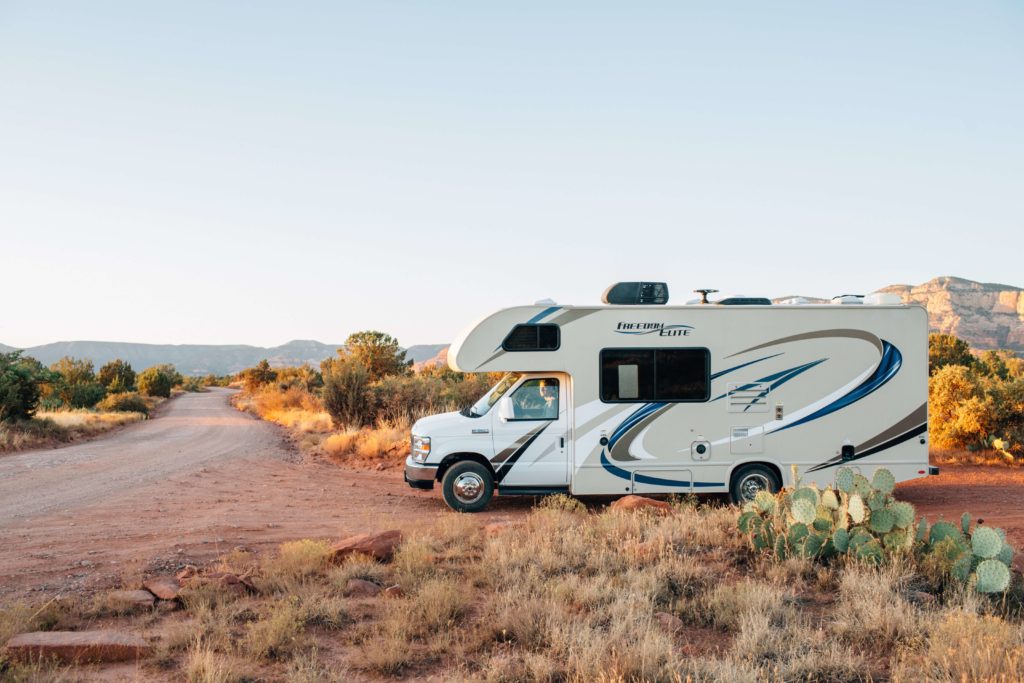Sure RVing is all about getting out in the great outdoors and exploring the nature that this planet has to offer, but that doesn’t mean you can’t relax and watch some TV in your downtime. Nowadays, even the smallest campers can be outfitted with a television set, which means you never have to go without entertainment.
But of course, a TV set doesn’t do much good without something on the screen, and getting a TV signal on the road isn’t always the easiest thing. If your campsite doesn’t offer a cable hookup, you’ll need to rely on an RV antenna to pick up a satellite or digital signal. We’re here to break down everything you need to know about these trusty devices so you won’t fall behind on your favorite programs or miss the big game.
What is an RV antenna?
Simply put, a TV antenna is a device that is designed to receive digital signals that broadcast television programming. An RV or camper antenna is specially designed to be affixed to the RV and provide the rig with a TV connection, much like it would in your house.
Types of RV antennas
Not all antennas are the same. There are two main types of antennas on the market today: satellite and digital.

Digital
Remember the old school rabbit ear antennas that everyone had on their home TV sets? Digital antennas and transmission works similarly to that— but instead of receiving an analog signal over the airwaves, a digital antenna receives data packets with the television programming.
This is a good option if you’re just looking for basic network TV shows, news, or your big sports games. These antennas can be fixed outside or inside your RV and give you access to local channels like ABC, NBC, CBS, FOX, and PBS in high definition. If you get a digital antenna that can pick up both UHF (ultra-high frequency) and VHF (very high frequency) signals, you will get more channels than you would with an antenna that picked up only one option.
The pro to a digital antenna is that you don’t have to pay for monthly service like you would with a satellite antenna. Once you purchase the device, the channels are broadcasted for free. The downside to this type is that you must be in range of a TV tower to get the signal. Most digital antennas can pick up transmissions from about 30-50 miles away. If you’re too far from the tower, the signal will be spotty— if you can pick up anything at all.
Satellite
Satellite antennas are almost always mounted on the outside of your RV. This is because they must have a clear, unobstructed view of the sky to receive the signal beamed down from a satellite.
Unlike a digital antenna, to get access to channels from a satellite service, you must be a monthly subscriber to a provider like DirecTV or Dish Network. However, subscribing to these providers gives you access to hundreds, if not thousands, of channels. And since your signal is coming from the sky and not a tower, you can get reception anywhere you have an unobstructed view of the sky.
How to choose the best RV TV antenna
Whether you decide to go with digital or satellite, you’ll want to consider a few things.
- Roof-mounted vs. portable: Are you looking for something permanently affixed to your RV roof, or something that you can move around on the roof or even on the ground next to the RV? Typically, roof-mounted units give you a better signal, but they are subject to the elements since you can’t bring them in during inclement weather or storage months.
- Crank vs. dome antennas: If you decide on roof-mounted, you have two options: crank or dome antennas. Crank antennas, whether they be automatic or manual cranks, work by raising the antenna into position with a hand crank when you’re at a campground. These are inexpensive and standard for most RVs. Dome antennas are newer technology and more expensive but don’t need to be raised and lowered.
- Weight: As with anything you bring onto your RV, you’ll want to consider the weight it adds. Though most are less than 10 lbs, some heavy-duty models can weigh upwards of 50 lbs.
- Internet capabilities: If you choose to go with a satellite option, you may also want to explore your satellite internet options. Not all antennas can pick up internet signals, so make sure to look into the internet reception capabilities before you purchase. Some also include WiFi boosters, which strengthen the WiFi connection from the campground.
- Installation requirements: Installation requirements may play a role in which option you choose. Roof-mounted antennas will take a little more effort compared to a tripod that you pop up beside your rig.

Luckily, technology has come a long way in the last few decades, meaning that most RVers can get an antenna to fit their needs, no matter the budget.
How to use an RV TV antenna
Using an antenna is easy! The exact protocol may vary from model to model, but here are some basics to follow:
- Install the antenna. Follow manufacturer’s instructions for installing or mounting the device. If you’re using a satellite antenna, you’ll also want to be sure you’re registered and subscribed to the service.
- Connect the TV to the antenna. Your antenna and/or receiver box will need to plug into your TV with a coaxial or HDMI cable.
- Set up your antenna when you arrive at the campsite. When you get to where you’re staying, make sure that it is in a position to receive a signal. For digital antennas, this means that it is in an upright position and facing the tower, if you can determine where that is. For a satellite antenna, this means having an unobstructed view of the sky.
- Get to watching! Once everything is plugged in, you should be good to go. If additional set-up is needed, follow on-screen instructions or contact your satellite provider if applicable.
Getting poor signal with a digital antenna? You may also want to purchase an RV antenna booster, which amplifies the TV signal and improves image quality.
Finding the best RV antenna
Not sure where to start your TV antenna hunt? Here are some of the most highly rated and reviewed models on the market today.
Best RV satellite antenna
- Winegard PL-8000 Dish Playmaker is a fully automatic system that can be either roof-mounted or put on a tripod for a portable configuration.
Best RV digital TV antenna
- The King OA8500 Jack HDTV with Signal Finder is a strong outdoor roof-mounted antenna with a compact, aerodynamic design.
- The Winegard RVW-395 Sensar IV outdoor antenna has a maximum range of 55 miles and picks up UHF and VHF programming.
- ANTAN Indoor Window HDTV Antenna is an indoor model that boasts a sleek, thin design and a 40-mile signal radius.
Kick back and relax with your RV TV
Whether you’ll be watching it every night or saving it for a rainy day indoors, a TV is always a nice luxury to have with you on the road. Thanks to the trusty RV antenna, thousands of RVers are able to enjoy their RV TV when they want, where they want.








